We were to cook ‘mini manty,’ or ‘pjelmeny’ (sp?) as they are known. For this we needed hot water, and so I filled the kettle. Ulan then explained that in Kyrgyzstan it’s important to fill the kettle right to the very top: a full kettle is an indication of a full and happy life. To me, a full kettle is one which is going to make the water spill over the top when it boils, getting hot water on the electrical contacts, which probably wasn’t a good idea for my Chinese-made kettle: maybe even the little orange light would stop working. But I decided it wasn’t worth arguing with Ulan, especially if it was just to point out a flaw in his national culture, so I let him fill the kettle to the brim. He did however congratulate me: "You chose a good kettle."
Another important thing in the Kyrgyz home is the knife: this should always be sharp, otherwise it brings shame to the home, especially to the man. My knife – I have just one – was sharp. The deep cut on my little finger from last week was proof of this. So far so good: my kettle was full and my knife was sharp.
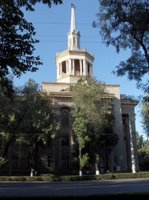 Ulan asked me if I had bread; I did, but it turned out to be mouldy, and I was about to put it in the bin when I got my third lesson in Kyrgyz culture: bread is sacred. This is something I’m still not used to, but bread really is considered sacred here. If you can’t appreciate this fact, you’ll be really puzzled when I finally get round to posting about Kyrgyz wedding traditions. Just accept that bread is sacred to Kyrgyz, like cows are sacred to Hindus.
Ulan asked me if I had bread; I did, but it turned out to be mouldy, and I was about to put it in the bin when I got my third lesson in Kyrgyz culture: bread is sacred. This is something I’m still not used to, but bread really is considered sacred here. If you can’t appreciate this fact, you’ll be really puzzled when I finally get round to posting about Kyrgyz wedding traditions. Just accept that bread is sacred to Kyrgyz, like cows are sacred to Hindus.So I couldn’t put the bread in the bin, because it’s sacred. What should I do with it then? Well, you shouldn’t let it go bad in the first place: it’s sacred. Ulan likes to talk, and he has an interesting technique for ensuring that his speech is not interrupted: he asks (and answers) his own questions.
“Bread is sacred. Why? Because when you are hungry, it feeds you. When you have nothing else to eat, you can eat bread. When you have something else to eat, bread will fill your belly. So you can never throw it away. Why? Because bread is sacred.” I suppose it makes sense.
At this point he had to pop back to the school. I then noticed that the kettle had indeed boiled over and Ulan had made a half-hearted attempt to mop it up with the tea-towel before escaping and leaving the problem to me. I disconnected the kettle from the mains and began mopping up, before I realised that the kettle hadn't just boiled over, it was actually leaking. Chinese crap. How can they sell a kettle which isn't waterproof?
When he returned, Ulan soon had to make some phone calls (see? It’s good to have a phone) and left me chopping tomatoes and cucumbers. I then asked him about the strange jar I’d found in one of the cupboards when I’d moved in. It was half-filled with a strange grey substance, a little like dust, and the lid was sealed; I hadn’t risked opening it.
“It’s bread,” explained Ulan. The previous occupant of my flat hadn’t thrown away his breadcrumbs, he’d carefully put them in a jar and never thrown them away. Even when he moved out of the flat, he hadn’t thrown them away.
Then Ulan spotted the end of a roll in my bin. “Is that bread?” he asked, and fished it out of the bin and put it with my mouldy bread. Wondering what his reaction would be, I told him that the kettle leaked. Of course, he didn't say that he'd seen it overflowing and had tried to mop up the water before running away; instead, he agreed it was rather strange, and said: "You didn't choose a good kettle."
The pjelmeny were coming along nicely, the cucumbers and tomatoes had been turned into salad, fresh bread had been stolen from Bolek, a bottle of kymys was in the fridge, tea was brewing, and the tin of sprats opened. Everything was ready, except for one thing: Ulan had to go. “I’ll be back in five minutes. They need me at the school,” he explained.
Quite hungry by this time, I wasn’t too impressed. These were five Kyrgyz minutes and lasted about half an hour.
During this time I had a rather odd phone call. Somebody I didn’t know wanted to speak to me, but she couldn’t speak English. It turned out we could both speak some German, so we managed to communicate. She had been given my phone number by somebody. Who? Somebody I’d never heard of had given somebody else my phone number and now this person wanted to talk to me in faltering German. It took some time to work out that Lena had given her my number – she used a different version of Lena’s name and I had no idea who she was talking about.
Gradually it became clear that this was the girl Lena had found for me as a Russian teacher. Well, good, but it was going to be tough to learn Russian in German, especially as neither of us was fluent in German. We arranged to meet on Monday morning at 8.30.
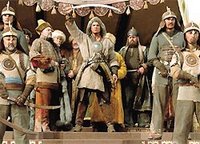
Ulan returned, and finally we could eat. He’s a fast eater and we were soon finished. Then he suggested showing me Bishkek by night, so off we went.
I had imagined visiting a couple of bars, but instead we just walked around the centre. It was interesting though, especially as after the recent nocturnal attacks I probably wouldn’t have ventured into town alone at night. We did see some drunken violence but not much; it was more interesting to observe the villagers who had come to experience the bright city lights. Street-side stalls cater for their tastes: you can have your photo taken with a landmark in the background, a cheesy border or pattern added to the photo and then printed onto cheap photographic paper; you can pose beside a shiny German car and have your photo taken; you can pose with a live snake and have your photo taken. Street-side karaoke is also popular, as in Ukraine, and small groups of teenagers huddle around the machines, singing along loudly and tunelessly to Kyrgyz pop songs.
Talking about Kyrgyz life, he explained to me that fighting is part of their culture. A man should be able to fight, otherwise he isn’t a real man. He has to be able to defend himself, his horses, his home and his family. (I wondered if this was in order of priority.) “Talk to the male students, ask them what they do in their free time. They’ll all tell you they learn judo or wrestling; they all want to be able to defend themselves. Talk to the girls, none of them fight, but they want to marry a man who can protect them.” It was true, the majority of male teenagers I’d spoken to were all keen in various combative sports, especially judo and wrestling.
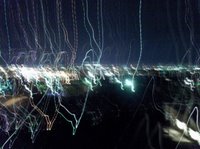 With this in mind, I shouldn’t be too surprised that first the cleaning girl and then Danny had been attacked: “If you can’t defend yourself, don’t go out at night,” explained Ulan. "I told Danny many times, 'Don't go out at night', but he didn't believe me."
With this in mind, I shouldn’t be too surprised that first the cleaning girl and then Danny had been attacked: “If you can’t defend yourself, don’t go out at night,” explained Ulan. "I told Danny many times, 'Don't go out at night', but he didn't believe me."If you want to go out, don’t go out alone.
The problem is compounded at this time of year by the arrival of fresh new (male) students: young, energetic, away from home for the first time, looking to ‘prove’ themselves in the big city, and bored with their studies. Violence comes naturally to them.
Picture: hooray for my C&B camera.
We also walked past a few statues and monuments, but my Carrot & Bush camera is rubbish at taking photos in poor lighting, so I quickly gave up trying. We also walked along one of the ‘parks’, a long thin stretch of paths and trees separating two roads: it’s a popular place for young couples to meet, though tonight it was occupied by groups of boys and girls, not mixing with each other, and drinking.
Deciding to move on, Ulan began driving somewhere, I assumed home. We passed the Vefa Centre, a shiny new shopping arcade; Ulan had never been in and decided he would like to. Inside, he was clearly more at home than he had been in Osh Bazaar. Everything was modern, with small fashion boutiques and recognisable Western names. We’d even had to pass through security gates to enter the centre; I don’t know why, they weren’t going to stop any bombs or guns because they didn’t even bother about my keys.
Most shops were closed, but Ulan was still happy exploring, until we came to the cinema. When he realised that we hadn’t missed the last film of the evening, he decided we should see it – even though it was in Russian. He phoned his wife using the ticket lady’s phone; yes, she would join us, so he bought three tickets.
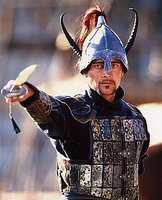 The film was due to start in five minutes so I assumed she would come by taxi. Of course I was wrong. We set off to pick her up. Ulan suggested I wait in the book shop, but I knew that this might mean waiting indefinitely and it would be better to stick with Ulan. As we left the Vefa Centre, Ulan commented that although the Centre was Turkish-built, Turkish-owned and Turkish-run, the security guards were all Kyrgyz. “Why? Because nobody here would accept a foreign security guard. How can a foreign person protect something in our country, that’s just wrong. If people here see a Russian or a Turkish security guard, they will wait for him outside, with a gang of their friends, and when he finishes work they will beat him up. It happened a few times, and now all the Turkish companies know to use only Kyrgyz security guards.”
The film was due to start in five minutes so I assumed she would come by taxi. Of course I was wrong. We set off to pick her up. Ulan suggested I wait in the book shop, but I knew that this might mean waiting indefinitely and it would be better to stick with Ulan. As we left the Vefa Centre, Ulan commented that although the Centre was Turkish-built, Turkish-owned and Turkish-run, the security guards were all Kyrgyz. “Why? Because nobody here would accept a foreign security guard. How can a foreign person protect something in our country, that’s just wrong. If people here see a Russian or a Turkish security guard, they will wait for him outside, with a gang of their friends, and when he finishes work they will beat him up. It happened a few times, and now all the Turkish companies know to use only Kyrgyz security guards.”It was a ten-minute drive to Ulan’s house. I waited in the car. Ulan explained that it was a safe neighbourhood: the local gang kept things safe. Criminals kept away because a member of the gang was always ‘on duty’ to protect the area. Ulan was known to be a resident there, so he was safe. If somebody else arrived, the gang member would question him, and if he wasn’t happy with the response, get rid of him. So by and large it’s a safe neighbourhood; occasionally there is violent between the gangs but this is usually pre-arranged and occurs at a ‘neutral’ location.
After waiting for roughly 10 minutes, Ulan returned without his wife. She wasn’t coming after all, but a cousin was instead. The cousin spoke no English.
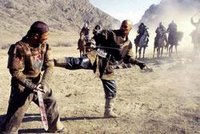 We arrived back at the cinema in time to miss several minutes of the film. It was in Russian, so I understood nothing. But at the end of each scene Ulan was happy to explain what was going on, so at least I could follow the plot. It was actually a highly entertaining film: a joint US-Russian-Kazakh production, it had a big enough budget to achieve some Hollywood-style special effects, but the Asian influence prevented this from being just another Hollywood action film. The plot may have had a few holes, but if only for the scenery and the images of traditional life in the region it was well worth watching. The basic story is a common theme here: local tribes unite (unwillingly) to repel a foreign invader, usually Mongol. The truth is that throughout much of the history of this region, the Kyrgyz and Kazakh nomadic tribes put more effort into fighting each other than common enemies, with the consequence that invading tribes and nations simply passed through the region on their way to richer destinations.
We arrived back at the cinema in time to miss several minutes of the film. It was in Russian, so I understood nothing. But at the end of each scene Ulan was happy to explain what was going on, so at least I could follow the plot. It was actually a highly entertaining film: a joint US-Russian-Kazakh production, it had a big enough budget to achieve some Hollywood-style special effects, but the Asian influence prevented this from being just another Hollywood action film. The plot may have had a few holes, but if only for the scenery and the images of traditional life in the region it was well worth watching. The basic story is a common theme here: local tribes unite (unwillingly) to repel a foreign invader, usually Mongol. The truth is that throughout much of the history of this region, the Kyrgyz and Kazakh nomadic tribes put more effort into fighting each other than common enemies, with the consequence that invading tribes and nations simply passed through the region on their way to richer destinations.Picture: view from the Panoram.
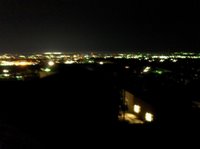 After the film, Ulan decided the night was still young and we should visit a bar. Within two minutes he’d changed his mind and decided we should buy some beer and food from a supermarket. Then he wanted to drive to the ‘Panoram’, a place in the mountains from which you have a panoramic view of Bishkek. So far so good: unfortunately he didn’t know the way. It took a long time to find it; when we got there, we ate the food, I drank the beer, and that was that. I got home at 3am and finally went to bed.
After the film, Ulan decided the night was still young and we should visit a bar. Within two minutes he’d changed his mind and decided we should buy some beer and food from a supermarket. Then he wanted to drive to the ‘Panoram’, a place in the mountains from which you have a panoramic view of Bishkek. So far so good: unfortunately he didn’t know the way. It took a long time to find it; when we got there, we ate the food, I drank the beer, and that was that. I got home at 3am and finally went to bed.
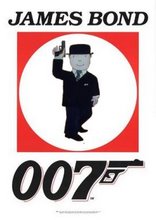
No comments:
Post a Comment